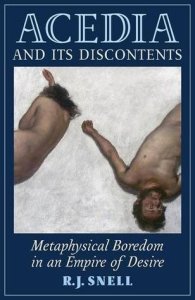 Acedia and Its Discontents, R. J. Snell. Kettering, OH: Angelico Press, 2015.
Acedia and Its Discontents, R. J. Snell. Kettering, OH: Angelico Press, 2015.
Summary: This is an exploration of the vice usually known as sloth, often thought of as laziness. The author argues that acedia is a contempt of all relationships and a destructive embrace of autonomous unchecked freedom rather than the love of God and the good work to which God calls us.
R. J. Snell has given us a both literate and theologically acute exposition of the nature of acedia, the vice commonly known as sloth but in fact is anything but what we would consider laziness. He argues that what was once considered a vice to be overcome has been transformed into an obsession with a kind of radical freedom jettisoning relationship with God, others, and creation in pursuit of an “empire of desire.” In the extreme, acedia takes the form of Judge Holden in Cormac McCarthy’s Blood Meridian who detests all except the exercise of his own will.
Snell begins his argument about subverting this “empire” by dealing with our nature, as creatures “from the dirt” and “for the dirt.” We are made by God from the earth and made for it, as gifts to that creation. We are called to work that respects the integrity things, to respect the integrity of the emergent properties of the earth’s systems (or building soil), and works in the proper direction, filling the temple of God.
Instead of living in these ways, the choice of acedia is a choice of boredom where nothing is esteemed of beauty and goodness and wonder. We hate our God-given tasks and the place and the people we are set in the midst of, except where these fulfill our desires. Instead of seeing the beauty of all things, the world becomes “bleached out” objects. In an excursus on contraception, Snell explores the bleached out character of sex without fertility. As one considers the growing incidence of sexual assault and sexual objectification, one begins to see the point of acedia as an empire of desire.
Resistance to this empire comes through the embrace of sabbath, a rhythm of work and rest and feasting that is the acceptance of the gift of God. And it comes in the embrace of smallness, the ordinary, everyday acts of faithfulness. Monks struggling with acedia dealt with it through the work of the cell–prayer, and the rhythms of monastic life. It is in living out our particular tasks in our particular place that we are shaped in a life of virtue. So it was with Jesus, learning under a carpenter and practicing that work until the final years of his mission.
As I read Snell’s account of acedia it seems the case he makes seems extreme except for the fact that what I think he unearths is a fundamental orientation that we may often mask by social conventions where we might consider ourselves more virtuous than we are. And the resistance he proposes seems at once so ordinary, and yet so contrary to our modern life. Keep sabbath, embrace the ordinary, accept God-given limits as real freedom. Not what we often want to hear, and yet the doorway to truth, goodness, beauty, and the bracing love of life for which we most deeply long.
_____________________________________
Disclosure of Material Connection: I received this book free from the publisher. I was not required to write a positive review. The opinions I have expressed are my own. I am disclosing this in accordance with the Federal Trade Commission’s 16 CFR, Part 255 : “Guides Concerning the Use of Endorsements and Testimonials in Advertising.”
Pingback: The Month in Reviews: November 2015 | Bob on Books
Pingback: Book Review: Acedia and Its Discontents | Emerging Scholars Blog